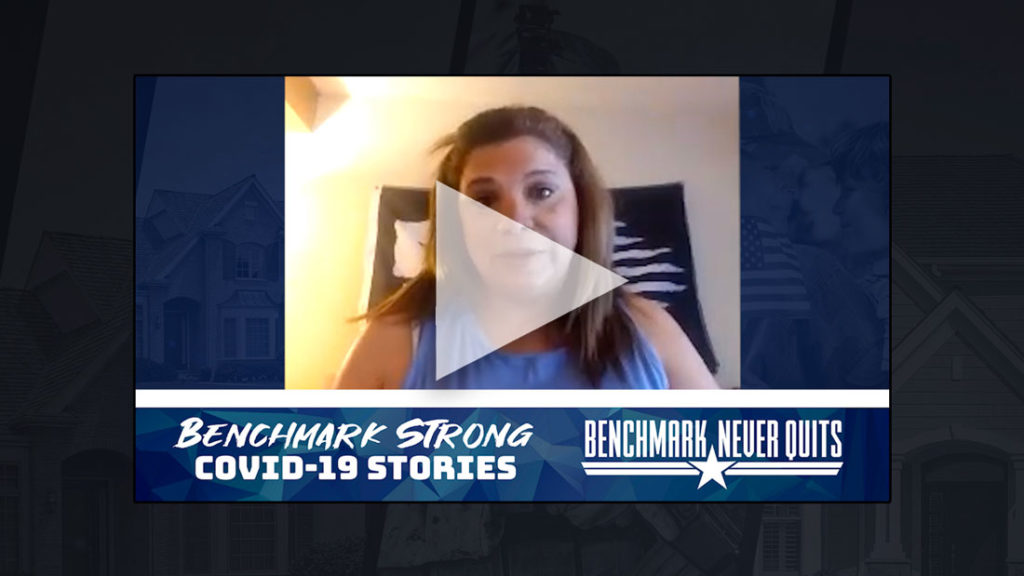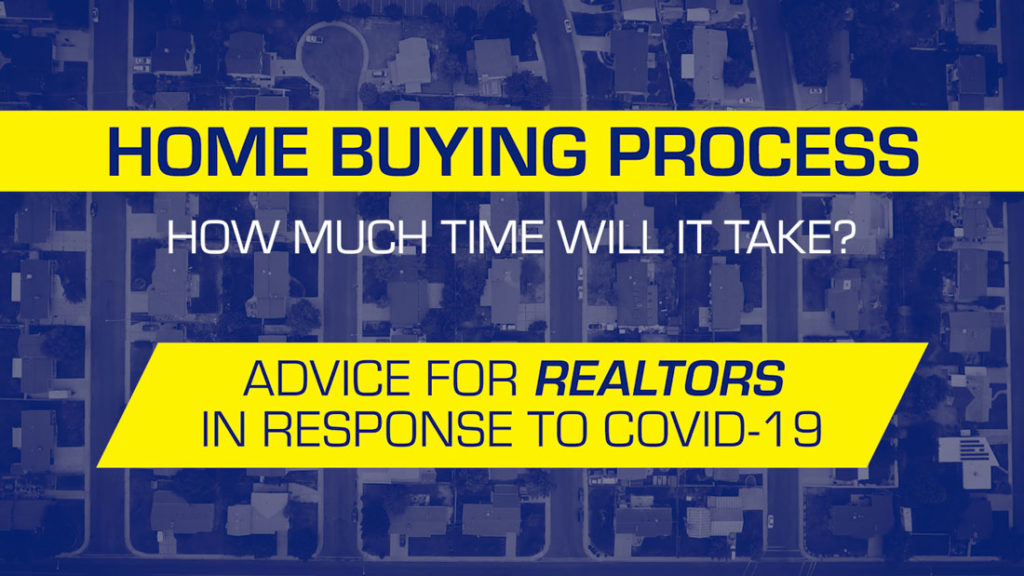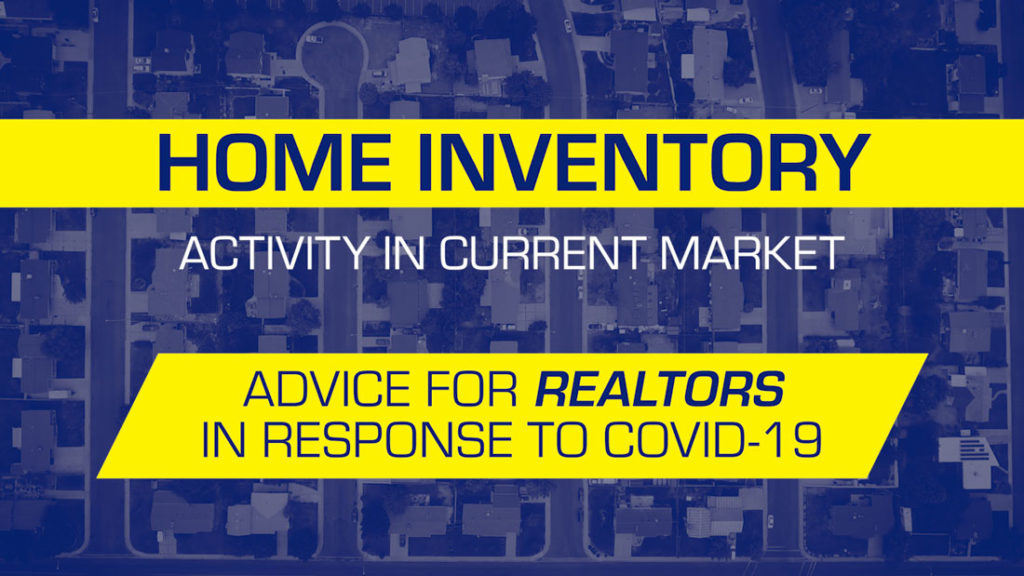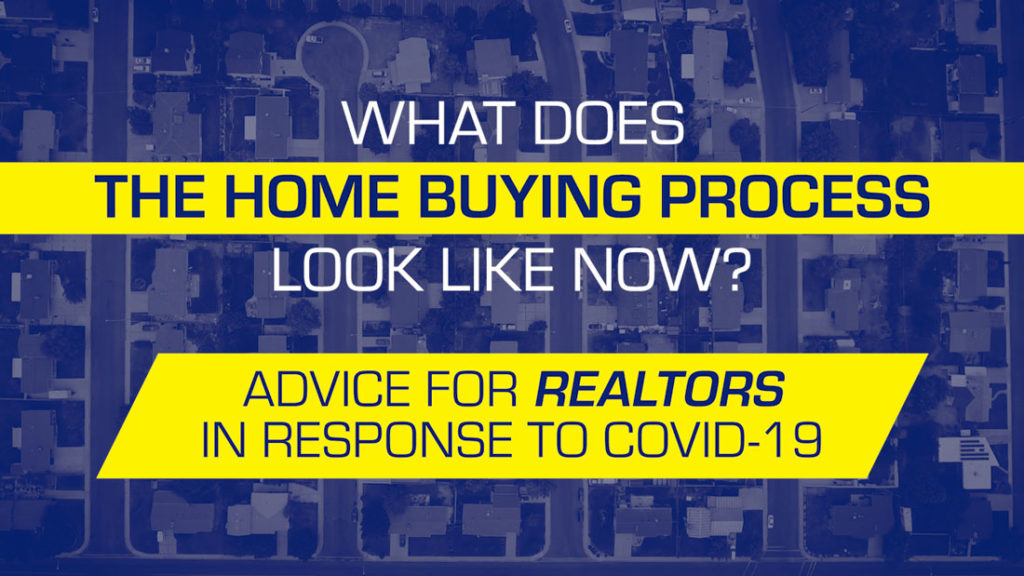What do you do when you move away in process of buying a home during a worldwide pandemic, finding yourself in a hotel which you can't leave? Benchmark never quits.


What do you do when you move away in process of buying a home during a worldwide pandemic, finding yourself in a hotel which you can't leave? Benchmark never quits.

Every day, we work hard to make sure that the "You" in our motto means everyone. We do not discriminate against any customer, and strive to provide a first-class mortgage experience for all.
Racism has no place in our society, and Benchmark is committed to providing equal access to everyone who desires the American dream of home ownership.


If you rent, you probably have good reasons. I bet that “paying my landlord’s mortgage”, “noisy neighbors”, or other caveats aren’t among them. Look, we know that owning isn’t right for everyone. As much as we write about why owning a home is better than renting, there are legitimate reasons for choosing to rent. For one thing, while renting may require a deposit, it doesn’t require a down payment. Renting is often the first choice for someone who wants or needs to be able to move with minimal hassle, or for someone whose focus is too occupied to be concerned with managing repairs and maintenance.
Whatever your reason, there is little doubt that most people probably want to eventually own their own home, even if not yet. If your reason is financial, you may think that buying is more expensive than renting. On one hand, you may have a point. On the other hand, the long view casts a long shadow of doubt on that assumption. Even if you plan to rent for awhile longer, educating yourself is always a good idea, especially if you plan to one day own, rather than rent, your own home.
Let’s talk about it.
Before we jump into the actually costs of buying and owning your own home, It would be shortsighted to not discuss how equity plays into the equation. For starters, if you don’t know what equity is, it is just the portion of a whole asset that you own. It can be calculated by subtracting the remaining loan balance from the total value of the home. This is a major reason why a Self-Made Millionaire Told Millennials To Buy A Home three years ago.
With every mortgage payment, a portion of it goes toward the principal balance of the loan. (See: Why Buying Is Investing) This means that, without any extra effort on your part, your net worth grows by the amount of the principal portion that you pay each and every month. How much of your rent adds to your net worth? Oh.. sorry, I didn’t mean to make you feel bad. When you rent, you add to your landlord’s net worth, not your own net worth. Hey, at least your money is helping someone, though, right? Let’s move on.
That depends. How much how do you want to buy? How much do you consider to be a lot? The truth is, you don’t need as much as traditional wisdom may have led you to believe. In my last article, Owning A Home May Already Be Within Reach, I talk a little more about that. There are conventional loan programs that require as little as 3% down, depending on your particular scenario. Assuming a $250,000 purchase price, 3% amounts to $7,500. However, a down payment is just putting your own investment dollars into the transaction. A down payment reduces your liability, and while you will no longer have the cash in hand after the transaction, it will not reduce your overall net worth. On the contrary, it could be the vehicle that gets you on your way towards a higher net worth than you would have access to otherwise. See a previous article we published, called Homeowner Average Net Worth 3,600% Higher Than Renter.
Ah, closing costs. Sometimes surprising first-time home buyers, the purchase of a home requires a lot of moving parts, and many parties who work together to make this transaction of real estate possible. Apply the economic principle of “There is no such thing as a free lunch” to the purchase of a house, and it’s logical, really. So how much are they? That all depends.
Generally speaking, home buyers will pay roughly 2-5 percent of the purchase price in closing and transactional costs. These can be seen as true costs, as they do not translate to equity in the purchased home. There is almost always room for negotiation on these, so it’s worth talking to your loan officer about this ahead of time. It is their job to put together a mortgage package that fits nicely with your own personal financial situation and goals.
When the plumbing needs work in your apartment, you know what to do. You either call your landlord, a property manager, or the maintenance number. At some point, someone will come to your apartment to do the necessary repairs. Simple.
When you own your home, you are on the hook for arranging the repairs yourself. Sure, there are home warranty packages you can purchase that cover certain repairs, but you’re on the hook for setting that up, too. Don’t be intimidated by this, though, because home warranty sellers are anxious to trade their promises for your hard-earned money. The debate about whether a home warranty is worth it or not is for another post.
Another option is to find your own contractor. This sounds like more work, but this is actually a huge advantage. Want to upgrade? Go for it. Find a killer deal? You’re free to call whoever you like. Depending on the repair, you may be able to DIY and learn a new skill while saving your money.
No matter which way you go about it, repairs and maintenance costs will come directly from your pocket. Do not gloss over this fact when considering how much house you can afford, or you might find yourself “house poor”. Remember, however, that homeownership is not a quick win. It is a long game of wealth accumulation. That’s probably not even the top reason why people buy homes. What’s your motive?
Like every other decision you make, there is an undeniable opportunity cost to buying a home. When you buy a home, you’ve lost access to the money that you used as a down payment. Maybe you wanted to use that money to pay for college, start a business, or save for a rainy day. Then again, maybe you recognize that the better option for you is to put it into a real asset like a home.
Another factor to consider is flexibility. You lose the opportunity to move in a hurry. If location flexibility is important to you, it can be beneficial to only have to pay a fee to break the rental contract and go at your convenience. If you own a home, you will either need to keep paying the mortgage for a home you’re not living in while paying for rent or a new mortgage for a home in your new location, or you will need to coordinate the sale of your home with your planned move. When you sell, you are taking the equity you’ve accumulated in the home in cash, which is difficult to see the down side of. You can also potentially keep your previous home, and make it available to rent to someone who could then help pay the mortgage for you with your asking rent price.
Your situation is your own, and it’s your responsibility to decide what is best for you. I sincerely hope you find this article helpful when you make that decision.
There is no such thing as a free lunch, and there is also no such thing as a free home.* When you rent, the most obvious cost to you is just that: rent. Whether you think your rent is a good deal, or whether you think it’s too high, the rent must be paid. Your rent helps pay for your landlord’s mortgage, adding to his (or her) net worth. Unfortunately, there is no long term fiscal benefit to the rent payment. It especially doesn’t help when the rent price goes up.
* Unless you live with family.. or other less common exceptions.
Since your home is not your own, you are at the mercy of your landlord, their property management, and local laws for your personal safety and security. Have you ever heard your neighbors arguing through the wall? Has a party gone on in the unit above you until well past a reasonable hour? Do the neighbors’ kids not understand what ‘courtesy’ means?
See: Owners Enjoy More Privacy and Security.
I’m not saying that buying means you get to choose your neighbors, but you can at least choose your neighborhood, and buy a single family home with no attached neighbors, if that’s what you want to do. If you buy a house with a yard, you have a green space to enjoy without having to go to a public park or courtyard just to enjoy the fresh air.
If you rent, you give up the option to really make your (well, your landlord’s) home your own. Do you want to change the paint color, wallpaper, tile, or carpet? You have to either get permission, do the work yourself, or both. With the costs involved, you probably won’t want to invest in your landlord’s equity with your own cash. I don’t blame you, especially since one of the benefits of renting is its transient nature.
Renting means giving up any future possible financial gains on your residence, because it’s not yours. (see: This New Year, Reach Your Dream of Homeownership for a little math on this). It’s possible that you can see any of the previous costs as opportunity costs as well. With a financial stake in your community, you will be more invested in the culture and politics of your neighborhood and your hometown. This is not to say that you cannot also be personally invested if you rent, but that may come from owning or operating a local business rather than renting a home.
“Expensive” is relative. Expensive compared to what? Does buying a home come with a lot of cost, including upfront costs? Yes. Is it cheaper to pay rent, without gaining equity, for decades? No. However, is the cost worth it to you? Ultimately, that’s the question, isn’t it? I don’t know your particular life circumstances, goals, or timelines. However, you do. This is an answer you will need to arrive to on your own, based on your own priorities.
More recommended reading: Rent or Buy? A Fool, Do Not Be
If you are curious to see specific numbers to bring clarity, you will want to talk to one of our mortgage professionals. At Benchmark, our loan officers specialize in tailoring the best matching loan arrangement for your personal goals and financial situation. Find your branch, and contact them for more information.Contact us today. It would be our honor to help you decide what’s best for you.Please call me or request a call. I would be honored to be part of helping you decide what’s best for you.
Benchmark brings you home.



Have you told yourself that you’re too _____ to buy a home? The blank could be almost anything. Whether you think you’re too broke, too poor, or your credit score is too low, are you allowing an invisible script to prevent you from attaining your dream of owning your own home?
Just a side note: You may also be interested in Top 5 Myths About Home Buying in 2020
You don’t have to be rich. You don’t have to have a 750+ credit score. You don’t need $50,000 in savings. Don’t believe me? Sit back, grab a cold drink, and hear me out.
If you can scrounge up ~$10k for a down payment, I wager that you can probably buy a home. It’s not a sure thing, of course, but hear me out. While a 20% down payment is excellent wisdom, it isn’t a requirement. Depending on the loan type, and where you buy, you could be required to pay less than 5% down to get into it. FHA loans require 3.5% down, which is less than $10k, assuming the median sales price of $248,867*. There are some conventional loans that require as little as 3% down. That’s ~$7,500, assuming a sales price of $248,867.
Let’s assume you don’t have the full ten grand lying around in a checking or savings account. Some, or even all, of your down payment can come from gifts from family, depending on certain restrictions. The point is that you maybe shouldn’t let your savings dictate your eligibility. Even if you haven’t been prioritizing your savings, how long do you think it would take to save up? I don’t pretend to know or understand your financial situation, but it may come down to something as simple as organizing your priorities.
* https://www.zillow.com/home-values/
The average FICO credit score in the United States as of September 10, 2019 was 706**. In fact, as of January 13 of this year, 59% of people in the US have a FICO credit score greater than 700, and only 18% have a credit score that is considered subprime***. For everyone else, there is probably a mortgage product or program that suits your needs. I don’t pretend to know you or to know about your finances, so take that with a grain of salt. None of this is a guarantee, but I’m guessing based on averages.
Even if your credit isn’t where you want it to be yet, there are such things a conditional approvals. To learn more about this, it’s best to contact a mortgage pro. I might have a suggestion about how to find one at the end of this article.
** https://www.fico.com/blogs/average-u-s-fico-score-ticks-706
*** https://www.experian.com/blogs/ask-experian/consumer-credit-review/
The total balance of your personal debt isn’t a very important factor in qualifying for a new home loan. Once again, I don’t pretend to have a clue about your personal finances, so forgive the section title. Your debt balance is important, but probably not when it comes to buying a home.
If you are worried about your student loan debt, don’t be. This kind of debt is a little more complicated, but it can be based on your monthly minimum due or 5% of the balanced divided by 12 months, unless you’re in deferment for more than a year past the closing date. Like I said, it’s complicated, but it’s probably not preventing you from buying a home. The only way to find out how your particular student loan arrangement affects your ability to buy a home is to talk to a mortgage pro. Don’t worry, we’ll get to that soon.
If you have any other kind of personal debt, only the minimum payment as listed on your credit report matters. No matter your debt, this is what you need to know. The equation is called the “debt to income” ratio, or DTI. This is a ratio of your monthly financial debt obligations and your monthly income. That helps determine how much house you can afford, when coupled with your down payment and creditworthiness.
If you dream of owning your own home, like I once did, the only way to really know what your options are is to talk to a mortgage pro. If you only remember one tip from this short article, this is it. Nervous? I understand. So do the pros here at Benchmark.
Find your local Benchmark branch, and reach out to them.Contact us however you want to find out more.Give me a call, or request one from me to explore your options.
Even if the answer is “not yet”, you’ve made the first step towards achieving your dream, and your Benchmark loan originatorwemy team will be with you every step of the way.
Benchmark brings you home.



Active duty service members move every 3 years on average. For military families, frequent relocation can create added stress, as you have to find new housing, coordinate the logistics of a move, and establish new roots in an unfamiliar place.
At Benchmark, we want to help alleviate some of that stress, and help ensure a smooth transition during your Permanent Change of Station (PCS). Below are some strategies to make your PCS experience easier.
The military offers many resources and entitlements to help you navigate your PCS move. A great place to start is your installation’s housing office, which can provide you an overview of the housing options available to you at your new installation. You may be granted up to 10 days of leave to travel to your new location to explore housing. If you are thinking about buying a home in your new location, this a great opportunity to go house hunting and check out properties for sale in-person.
To coordinate moving logistics, get in touch with your local installation’s personal property office. They can provide you all of the options to coordinate your move with one of their transportation providers. Alternatively, you may opt to handle the move on your own with a Personally Procured Move (PPM), which allows you to be reimbursed to move your own belongings. Make sure you ask about additional entitlements and expense reimbursements that might be available to you during your move. Depending on your situation, you may be eligible to receive reimbursements for Temporary Lodging Expenses (TLE), a Dislocation Allowance, per diem travel allowances, non-temporary storage, and more.
Finding a lender that has experience with military buyers can make a huge difference when navigating the home loan process during a PCS move. At Benchmark, we are committed to providing an outstanding home buying experience for our military clients. We understand the unique challenges you face as an active duty service member looking to buy a home in a new community.
Once you have your PCS orders and decide buying a home is the right choice for you and your family, get in touch with a Benchmark Loan Officer to get pre-approved for a home loan. A pre-approval lets you know your price-range when searching for homes and puts you in the strongest possible position to make an offer. We can also connect you with a Veteran-friendly real estate agent who specializes in assisting relocating military personnel. Choosing the right realtor who has experience working with buyers during the PCS process will make a big difference towards securing the perfect home with ease.
Taking advantage of technology can help guarantee a thorough home search process alongside your realtor while limiting the amount of time you need to spend on the ground in your new location. Your realtor can provide you with an online search tool to check out homes within your price-range and specifications. Many listings today offer virtual tours to help you envision what the space feels like beyond traditional photos.
Once you have narrowed down your options online, your realtor can arrange a virtual video tour using a video-chatting app to lead you through the property and answer any questions you may have as they move through each room. Throughout the virtual ‘walk-through’ of the home, you can ask questions like, “can you show me how big the closets are” or “how high are the ceilings in the living room?,” so you get a better feel for the functionality of the home. If you do have the opportunity to personally tour homes in advance of your PCS, you can focus on your top contenders without having to waste time on properties that are not a good fit.
At Benchmark, we have created an “easy button” to ensure a smooth home buying process for our military clients. Our team will take care of you on your journey to your new home, and ensure you have a first-class experience. If you have any questions about the PCS process, get in touch with one of our local experts or join one of our PCS Facebook communities.
Moving is common with the Military. Whether you’re relocating to another state or country we want to give you the peace of mind you deserve. When purchasing a home you need speed and certainty. We can provide you and your family the certainty you deserve by fully underwriting your file prior to making your offer. That will put you in the best position to win in a competitive market. You’ve made a commitment to us. Now it’s our turn.
If you are ready to talk to a professional, contact your local Benchmark branch today.call me or contact me today.contact us today, and let our team take care of you.



We previously talked about Forbearance as an option for anyone negatively impacted because of COVID-19. Forbearance is one of the most common options for those who cannot make their mortgage payments on time. Typically, once a loan is out of the agreed timeframe of forbearance, the borrower is expected to pay a “balloon payment,” or the total of all the payments missed plus the current payment. Fannie Mae and Freddie Mac have released their payment deferral plans to assist homeowners in forbearance.
Freddie Mac states,
COVID-19 Payment Deferral will be available to homeowners with Freddie Mac loans starting July 1, 2020, at which time your servicer will begin evaluating your eligibility. Your servicer will contact you about 30 days before the initial forbearance plan is scheduled to end to determine which Freddie Mac assistance program is best or if additional forbearance is needed.
http://www.freddiemac.com/blog/homeownership/20200514_understanding_payment_deferral.page
Fannie Mae offers three different options for borrowers who have entered forbearance:
- Homeowners who are experiencing a financial hardship caused by COVID-19 may request a forbearance plan through their mortgage servicer (the company listed on their mortgage statement). Homeowners must contact their mortgage company to request assistance. Under a forbearance plan, a homeowner may be able to temporarily reduce or suspend their mortgage payment while they regain their financial footing. Forbearance does not mean a homeowner’s payments are forgiven. Homeowners are still required to eventually fully repay their forbearance, but they won’t have to repay it all at once — unless they choose to do so.
- Homeowners have several options to pay back unpaid amounts accrued during their forbearance period. Mortgage servicers will attempt to contact homeowners 30 days before their forbearance plan is scheduled to end to determine which assistance program is best for them at that time.
- Full repayment: Homeowners have the option of immediately reinstating their loan, which means catching up on all the missed payments in a single payment if they can afford it. If a homeowner chooses to reinstate their loan, they can continue to pay their mortgage under the terms originally agreed to before they received forbearance.
- Short-term repayment plans: Homeowners can gradually catch-up on the past-due amount over an agreed-upon time frame (for example, 3, 6, 9, 12 months). A portion of the past due amounts must be paid in addition to their existing monthly mortgage payments. Upon completion of their repayment plan, they can continue paying their mortgage under the terms originally agreed to before they received forbearance.
- COVID-19 payment deferral: Homeowners can resume their regular monthly payments and the amount of their missed payments moves to the end of the loan term. Note: Mortgage servicers will begin offering the payment deferral repayment option starting July 1, 2020.
- Loan modification: The original terms of the loan are changed in order to make the borrower’s monthly payments more manageable and address their ongoing hardship.
https://www.fanniemae.com/portal/media/corporate-news/2020/covid-payment-deferral-7018.html
Now that there is more explanation regarding ways to enter and come out of forbearance, we still want to caution borrowers to only enter in forbearance if a true economical hardship due to COVID-19 has occurred and you can no longer make your mortgage payments. Mortgage forbearance will go on your credit history, and it is still unclear if a mortgage forbearance will impact a person’s credit score, or by how much if it does.
If you or someone you know would like to discuss your options, contact your local Benchmark branch today.call me or contact me today.contact us today, and let our team take care of you.

The team you work with matters! The industry has changed a lot, and working with an expert who can navigate the changing guidelines is more important than ever. Lenders today are dealing with constraints that have taxed the entire industry with challenges, including long wait times on appraisals. In some cases, some lenders are just not sending funds to close their loans. Ultimately, how long is the home buying process taking? Overall, transaction times haven’t changed very much. Benchmark has a team dedicated to making sure loans close quickly, efficiently, and on time. Read more

Home inventory helps predict whether it’s a “Seller’s Market” or a “Buyer’s Market.” When there are too many houses for sale, the buyer has the advantage. When there are not enough houses, sellers have the advantage. Home inventory changes based on location, so good advice in one city, may be harmful in another. No matter what inventory level your area is seeing, the important thing to note is that houses are still selling, people are still moving, and you can too! Ask your local Benchmark Loan Officer to connect you with one of their trusted realtor partners to get started today! Read more

If you are considering listing your house for sale, you have probably considered the fact that people will want to come tour the inside of the house. This is where the realtor you choose can make a big difference. Photographs and 3D digital tours have become popular solutions to boosting your house listing, and allow potential buyers to see enough of the house that they may make an offer, site unseen. Realtors are also seeing that every protective measure is taken to make sure they enter a house with facemasks and sanitization before, and after, viewing a house. Read more

It’s no secret that realtors work hard to create a great home finding process for their clients. For top notch realtors, this has not really changed. Restrictions have been put in place to ensure that visiting homes is done safely, and inline with the CDC’s recommendations. When home sellers have multiple people wanting to look at the house, Realtors will often try to access the house without their clients, providing a walk-through video, as well taking note of things the homebuyer may want to know about. This requires a lot of trust in your realtor partner, and borrowers may need to be ready to potentially purchase a house without actually stepping foot inside of it. Read more

It’s no secret that realtors work hard to create a great home finding process for their clients. For top notch realtors, this has not really changed. Restrictions have been put in place to ensure that visiting homes is done safely, and inline with the CDC’s recommendations. When home sellers have multiple people wanting to look at the house, Realtors will often try to access the house without their clients, providing a walk-through video, as well taking note of things the homebuyer may want to know about. This requires a lot of trust in your realtor partner, and borrowers may need to be ready to potentially purchase a house without actually stepping foot inside of it.

If you are considering listing your house for sale, you have probably considered the fact that people will want to come tour the inside of the house. This is where the realtor you choose can make a big difference. Photographs and 3D digital tours have become popular solutions to boosting your house listing, and allow potential buyers to see enough of the house that they may make an offer, site unseen. Realtors are also seeing that every protective measure is taken to make sure they enter a house with facemasks and sanitization before, and after, viewing a house.

Home inventory helps predict whether it’s a “Seller’s Market” or a “Buyer’s Market.” When there are too many houses for sale, the buyer has the advantage. When there are not enough houses, sellers have the advantage. Home inventory changes based on location, so good advice in one city, may be harmful in another. No matter what inventory level your area is seeing, the important thing to note is that houses are still selling, people are still moving, and you can too! Ask your local Benchmark Loan Officer to connect you with one of their trusted realtor partners to get started today!